英语:unit2 friendship教案(冀教版必修1)
冀教版高中英语必修1Unit2Friendshipgrammar学案
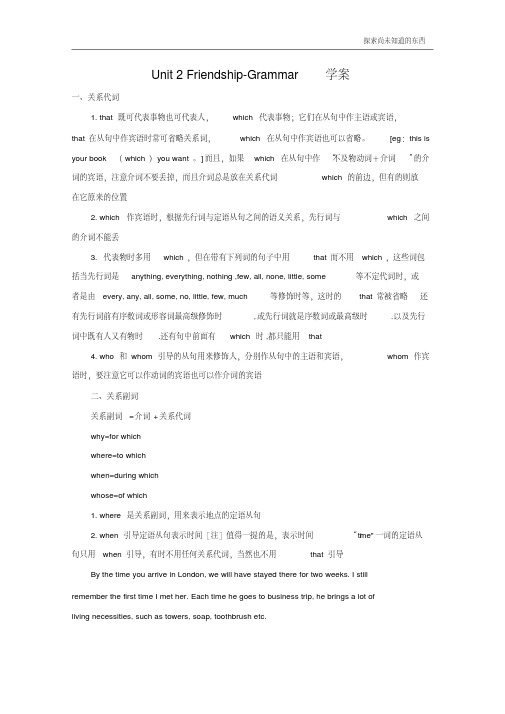
Unit 2 Friendship-Grammar学案一、关系代词1. that既可代表事物也可代表人,which代表事物;它们在从句中作主语或宾语,that在从句中作宾语时常可省略关系词,which在从句中作宾语也可以省略。
[eg:this is your book (which)you want。
]而且,如果which在从句中作“不及物动词+介词”的介词的宾语,注意介词不要丢掉,而且介词总是放在关系代词which的前边,但有的则放在它原来的位置2. which作宾语时,根据先行词与定语从句之间的语义关系,先行词与which之间的介词不能丢3. 代表物时多用which,但在带有下列词的句子中用that而不用which,这些词包括当先行词是anything, everything, nothing ,few, all, none, little, some等不定代词时,或者是由every, any, all, some, no, little, few, much等修饰时等,这时的that常被省略还有先行词前有序数词或形容词最高级修饰时,或先行词就是序数词或最高级时.以及先行词中既有人又有物时.还有句中前面有which时,都只能用that4. who和whom引导的从句用来修饰人,分别作从句中的主语和宾语,whom作宾语时,要注意它可以作动词的宾语也可以作介词的宾语二、关系副词关系副词=介词+关系代词why=for whichwhere=to whichwhen=during whichwhose=of which1. where是关系副词,用来表示地点的定语从句2. when引导定语从句表示时间[注]值得一提的是,表示时间“ti m e"一词的定语从句只用when引导,有时不用任何关系代词,当然也不用that引导By the time you arrive in London, we will have stayed there for two weeks. I stillremember the first time I met her. Each time he goes to business trip, he brings a lot ofliving necessities, such as towers, soap, toothbrush etc.3. whose是关系代词,修饰名词作定语,相当于所修饰成分的前置所有格.它引导的从句可以修饰人和物, 当它引导的从句修饰物体时, 可以与of which 调换,表达的意思一样.4. 当从句的逻辑主语是some, any, no, somebody, anybody, nobody, something, anything, everything或nothing时,常用there is来引导There is somebody here who wants to speak to you. 这里有人要和你说话Some exercises1.The teacher has two children, ___ are doctors.A.both of themB. both of the childrenC,both of whom D. both of who2.Do you still remember the chicken farm___ we visited three months ago?A.whereB. whenC. thatD.what3.George Orwell,____was Eric Arthur,wrote many political novels and essays.A. the real nameB. what his real nameC. his real nameD. whose real name4.Madame Curie,for___life had once been very hard ,was successful later.A.whomB.whoseC.whichD.that5. Women ___drink more than two cups of coffee a day have a greater chance of having heart disease than those _____don’t.A. who; /B. /; whoC. who; whoD. /; /6.He was educated at a local grammar school,___he went on to Cambridge.A. from whichB. after thatC. after whichD. from which7.I still remember the persons and things___we talked about last week.A.whoB. whomC. thatD. which8.The man,___car was parked on the wrong side of the road ,had to pay a fine.A. whomB. hisC. whoseD. which9.He has to work on Sundays,____he doesn’t like.A. and whichB. whichC. and whenD. when10. Children, in my opinion,____creative ability is unthinkably rich,____is seldom taken notice of by us ,should be trained in that area.A. which; thatB. which; which C, whose; which D. whose; thatAnswers: CCDACCCCBC。
河北省高一英语必修1 Unit1《Friendship》全套教案

河北省高一英语必修1 Unit1《Friendship》全套教案教学目标Knowledge aims:1. Get the students to learn the following useful new words and expressions:reason list share feeling Netherlands German series outdoors crazy nature purpose dare thunder entirely power according trust indoors share. . . with. . . go through hide away set down a series of be crazy about on purpose in order to in one’s power face to face according to2. Help the students to find the words and phrases that they find most difficult and help them to understand.Ability aims:Help the students develop their reading ability and learn to use some reading strategies such as guessing, key sentences, skimming, scanning and so on.Emotional aims:Enable the students to realize the importance of friends and friendship, value the friendship between friends by learning the reading text and tell true friends from false friends in their lives.教学重难点教学重点Get the students to learn different reading skills.教学难点Get the students to learn different reading skills for different reading purposes.教学工具教学过程→Step 1 Revision1. Check the homework exercises.2. Ask some students what a friend is.→Step 2 Lead-inEnjoy the song That’s What Friends Are For with the students. Ask the st udents to find out what it is about.→Step 3 Pre-readingAsk the students the following questions so as to begin to focus students’ attention on the main topic of the reading passage.1. Why do you need friends? Make a list of reasons why friends are important to you.2. What do you think a good friend should be like? List the good qualities a good friend should have.3. Does a friend always have to be a person? What else can be your friend?4. Have you ever considered making friends with animals, plants or even an object? Why or why not?(The teacher can also tell students some background before starting to read. This is a true story. It took place in Amsterdam, Holland in the early 1940s after German Nazis had occupied most of Europe. They killed many Jews. To avoid being killed, some Jewish families went into hiding, often with the help of non-Jewish friends. This is what Anne’s family did. )→Step 4 Reading1. Get the students to try to guess what Anne’s friend was and what the passage is about by reading the title and having a quick look at the pictures in this passage without reading it.2. Get the students to skim the first two paragraphs to confirm their guessing.3. Have the class to read the passage silently and then ask them to answer the following questions.1)What was Anne’s best friend? Why did she make friends with it?2)Did she have any other true friends then? Why?3)What is the difference between Anne’s diary and those of most people?4)Do you keep a diary? What do you think most people set down in their diaries?5)We are going to read one of Anne’s diaries, but before reading, can you tell me what the diary is about with the help of one key sentence in the second paragraph?4. Reading Anne’s diary1)While reading, guess the meanings of “spellbound”, “hold me entirely in their power” from the discourse.2)After reading, ask the students how Anne felt in the hiding place and get them to give the two examples to show her feelings then.3)Choose the best answer according to the diary.(1)Anne made friends with her diary because______________.A. she didn’t like her other friendsB. she was a shy girlC. she trusted nobodyD. she didn’t have a chance to communicate with her friends(2)From the diary we can infer that______________.A. Anne was a girl who loves natureB. Anne was good at writing diariesC. Anne was longing for a normal life and she especially missed going outside and enjoying natureD. Anne had good observation in her daily life(3)Why did Anne and her family have to hide?A. Because they were not Germans.B. Because they were asked to do so.C. Because they did something bad.D. Because they were Jewish.(4)What is the author’s attitude towards Anne in this passage?A. Angry.B. Happy.C. Sorry.D. Disappointed.(5)What is Anne’s tone from her diary?A. Sad.B. Hopeful.C. DisappointedD. Angry.(6)What made Anne crazy about nature?A. Her interest in nature.B. She had no friends.C. She couldn’t get outdoors for a long time.D. She could do nothing but watch nature.Suggested answers:(1)D(2)C(3)D(4)C(5)A(6)C4)Ask the students to read the diary again and try to retell it. The retelling must include the information required below:Sample retelling:The diary by Anne, a Jewish girl, gave a glimpse of her life during h er family’s shelter in Amsterdam from the German Nazis’ killing in the Second World War. She treated the diary as her best friend, and in it she revealed her longing for a normal life and close contact with nature, which helped her get through the days.→Step 4 Reading aloudPlay the tape of the passage for the students to listen and follow. Make sure the students phrase long sentences correctly by pausing at suitable places.→Step 5 Post-reading1. Get the students to do the exercises in the part Comprehending.This part helps students further understand the text by doing multiple choices, questions and answers, and matching.2. Group workThink about and work in groups to discuss the following questions.1)What would you do if your family were going to be killed just because they did something the Emperor did not like?2)Where would you plan to hide?3)How would you arrange to get food given to you every day?4)What would you do to pass the time?→Step 6 Consolidation1. Books shut. Get the students to tell something about Anne.2. Books open. Get the students to discover useful words and expressions from the part Reading to complete the following sentences.Show the exercises on the screen or give out exercise papers.1)She has grown______________ about computer games.2)Was it an accident or did David do it on______________?3)From the beginning, Paul made it clear that he would be______________(完全地) in control.4)He used to work______________ even in the middle of winter.5)______________ get her boyfriend to find her, she______________ for many years.6)______________ what he said, we can draw a conclusion that he just told______________ white lies.7)Born in a poor family, the president______________ lots of hardships in his childhood.8)A diary is often kept to______________ what happens in people’s daily lives.9)When they met with each other on a quiet evening at the end of the street, they said nothing______________.First get the students to do the exercises. Then the answers are given. The teacher can give them explanations where necessary.Suggested answers:1)crazy2)purpose3)entirely4)outdoors5)In order not to, hid away6)According to, a series of7)went through8)set down9)face to face→Step 7 Homework1. Read the passage again and try to retell it.2. Finish off the related Workbook exercises.3. Write one or two sentences to express your understanding of friends and friendship.Ending Let’s listen and sing the song That’s What Friends Are For together课后小结学完了这节课,你有什么收获?课后习题1.It took months for things to c________ down after we had the baby.2.The phone rang,but she ________(不理睬)it.3.The post office will issue a ________(系列)of new stamps.4.As far as I am c________,I can't agree with what you said.5.You make it sound as if I did it on p________!6.She suffered from the loss of her pupils' respect,which u________ her.7.The boy hid himself behind the c________ and looked out through the window.8.The boss was e________ satisfied with what the workers had done.9.Doctors are predicting that it will soon be within their ________(能力)to cure the disease.10.Children should spend more time taking exercise __________________________(在户外)and less time watching TV at home.板书Unit 1Friendship。
英语教师说课比赛课件UNIT2Friendship冀教版必修一(共20张PPT)

Reading (Interaction)
Hot topics for the students to talk about with the teacher
(1) If you do sth wrong, what will you say to other people? (2).If your friend doesn’t look right, what will you say to him?
Waiting for your early reply Best wishes!
Yours Miss Zhang
Blackboard design
• 1.Friendship is important to us and we should learn to be friendly to others
A new passage similar to the text:
• Friends are very important in our society. If you want to be happy you should learn to make friends with others and learn to get on well with them. Choose different good friends who we can rely on. You will find your life much happier .Be friendly to the people around you . They will become your friends. Please believe friends play an important part in our life. So we must treasure the friendship
高中英语 Unit2 friendshipgrammar(1)课件 冀教必修1

基础练习
1. Is that the house __B__ you bought last year? A. where B. which
2. Is that the picture _A__ you are laughing at? A. which B.where
3. It is the most interesting book _B__I’ll ever read. A. which B. that
A. which B. what C. whatever D. that
7. All of the flowers now raised here have developed from those ____ in the forest.
A. once the grew B. they grew once C. that once grew D. once grew. 8. I don’t like ____ you speak to her. A. the way B. the way in that C. the way which D. the way of which
Fill in the blanks with who, whom, whose, which and that.
1. The man _w_h_o_ I saw told me to wait. 2. The man to _w_h_o_m_ I spoke was a foreigner. 3. I know a boy _w_h_o_s_e_ father is an acrobat. (杂技演员) 4. He saw a house w__h_o_s_e windows were all broken.
冀教版高中英语必修1教案Unit 2 Friendship 2

Unit 2 Friendship (2)一. 教学内容:Unit 2 Friendship(II)二. 语法讲解I. 定语从句在复合句中修饰名词或代词的从句叫定语从句(Attributive Clauses)。
被修饰的名词或代词叫先行词。
定语从句由关系代词和关系副词引出。
关系代词和关系副词在定语从句中担任句子成分。
关系代词有:who, whom, whose, that, which关系副词有:when, where, why(1)关系代词引导的定语从句关系代词所代替的先行词是人或物的名词或代词,并在句中充当主语、宾语、定语等成分。
关系代词在定语从句中作主语时,从句谓语动词的人称和数要和先行词保持一致。
①who, whom, that这些词代替的先行词是人的名词或代词,在从句中所起作用如下:Is he the man who/that wants to see you?他就是你想见的人吗?(who/that在从句中作主语)He is the man whom/ that I saw yesterday.他就是我昨天见的那个人。
(whom/that在从句中作宾语)②whose 用来指人或物,(只用作定语, 若指物,它还可以同of which互换)。
例如:They rushed over to help the man whose car had broken down.那人车坏了,大家都跑过去帮忙。
Please pass me the book whose (of which) the cover is green.请递给我那本绿皮的书。
③which, that它们所代替的先行词是事物的名词或代词,在从句中可作主语、宾语等。
例如:A prosperity which / that had never been seen before appears in the countryside.农村出现了前所未有的繁荣。
高中英语必修一第二单元教案

高中英语必修一第二单元教案一、教学任务及对象1、教学任务本教案针对的是高中英语必修一第二单元的教学内容。
该单元的主题为“友谊”,旨在帮助学生掌握与友谊相关的词汇、语法、句型,培养学生在实际语境中运用英语进行交流的能力,同时加强学生的听说读写综合技能。
教学内容包括:词汇学习(如:friendship, loyal, trustworthy等)、语法点(如:一般现在时、一般过去时)、课文理解、听力训练、口语表达以及写作练习。
2、教学对象本教案的教学对象为高中一年级学生,他们在初中阶段已经具备了一定的英语基础,但在高中阶段需要进一步提高英语综合运用能力。
学生们的英语水平参差不齐,因此,在教学过程中需要关注每一个学生的学习需求,因材施教,使他们在原有的基础上得到提高。
在教学过程中,要注意激发学生的学习兴趣,培养他们自主、合作、探究的学习习惯,帮助他们树立正确的学习观念,使他们在轻松愉快的氛围中学习英语,提高英语素养。
同时,要关注学生的情感需求,营造一个和谐、友善的课堂氛围,让他们在友谊的陪伴下共同成长。
(1)掌握与友谊相关的词汇、语法、句型;(2)运用所学知识进行听说读写实践活动;(3)理解课文内容,提高阅读理解能力;(4)培养良好的学习习惯,提高英语综合运用能力;(5)树立正确的友谊观,懂得珍惜友谊。
在此基础上,教师应运用多种教学策略,关注每一个学生的成长,使他们在英语学习中获得全面发展。
二、教学目标1、知识与技能(1)词汇:学生能够掌握本单元的基本词汇,如friendship, loyal, trustworthy, support, communicate等,并能够在实际语境中正确运用。
(2)语法:学生能够理解并掌握一般现在时和一般过去时的用法,能够运用这两个时态进行句子构建和文章写作。
(3)听力:学生能够听懂与友谊相关的对话和短文,提高听力理解能力,并能够抓住关键信息进行答题。
(4)口语:学生能够在日常生活中使用英语进行与友谊话题相关的交流,表达自己的观点和感受,提高口语表达能力。
高中英语 Unit2《Friendship》课件2 冀教版必修1

1.( F) Mary doesn’t need help.
本题关键词是Mary说I guess I could use some help.
2.( T) Jack had a wonderful meal in Tom’s home. 本题关键词是Jack说Thank you for a wonderful meal.
3.( B) What makes good friends? A good friend should .
A. be lovely and cool
B. be kind and patient
C. have lots of money
D. have good looks
本题的关键词是…If he or she doesn’t want to talk, you could
singer in our class. • J: I’m just afraid of singing in front of so many people,
and I also don’t have enough confidence! You know, there are quite a lot excellent ones! • T: Oh, come on! Believer yourself! You’re the best! As long as you prepare well, you’re sure to win. Take it easy! Also, you should realize this is a good chance to communicate with other students who are good at singing. • J: Thanks a lot, Tom!
高中英语 Unit 2 Friendship知识总结 冀教版必修1

Unit 2 Friendship 知识总结合作与讨论Read the following material and then have a discussion.Hua is a high school student. She gets along well with a tall boy in her class. When she sees the boy smoking a cigarette at school, she will decide to try to smoke, too. If the boy suggests doing something that Hua doesn't like, she will change her mind about it and agrees with him. And when Hua asks the boy to lend her some money, he will give her the money and say that she doesn't need to give it back. They say they have become really good friends.1.What's your opinion on their friendship?我的思路:It is not the right way to make friends.2.What advice would you like to give to the friends?我的思路:True friends should trust each other. When you see your friend smoking, you should talk to him(or her)and remind him(or her)gently of the health dangers. If your friend suggests doing something that you don't like, you should say what you like and dislike about it. And if your friend asks you to lend him some money, you can lend it if he(or she)promises to pay it back promptly.文本互动Friendship is the topic of this unit, so I think I will be more clear about what is true friendship after learning it. Meanwhile I'll try to improve the following skills: 1.Listening: Listen to the tape and try to grasp the main idea of the text. Finish the listening exercises of the unit.2.Speaking: Read the text aloud and discuss some related questions with classmates.3.Reading: Enjoy the beautiful language of the text as well as master the important words, phrases, sentences and grammar points.4.Writing: Learn how to write a letter in English.句型剖析1.Only when…can they build up a strong fire.当only连同其所修饰的状语部分一起置于句首时,主句要用部分倒装语序,即通过提前助动词/情态动词/ have / be等引起倒装。
冀教版必修1Unit 2《Friendship》ppt课件
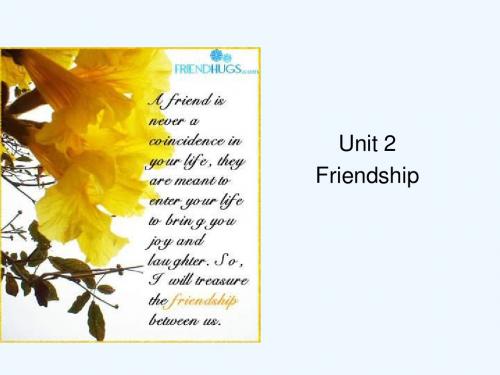
3. estimate
w much money does Bill Gates have?
His net worth is estimated to be US $56 billion. How much would it cost to build an Olympic-sized pool?
Can you give some examples of great friendship? Marx and Engles Marx ___________ Engels’ valued friendship so highly that he once said he loved and admired his friend very much. Engels had been ________ aiding Marx who suffered greatly from bitter poverty. Were it not obtained for the help Marx _________ from Engels, Marx would hardly have been able to __________ overcome poverty and he surely would not have left behind him a monument.
-- George Eliot (1819~1880), English novelist
Home
Friends
Questions and Answers
A friend is a person with whom I may be sincere. 4. How can friend and friendship be defined? Before him, I may think aloud.
高中英语必修1第二单元教案
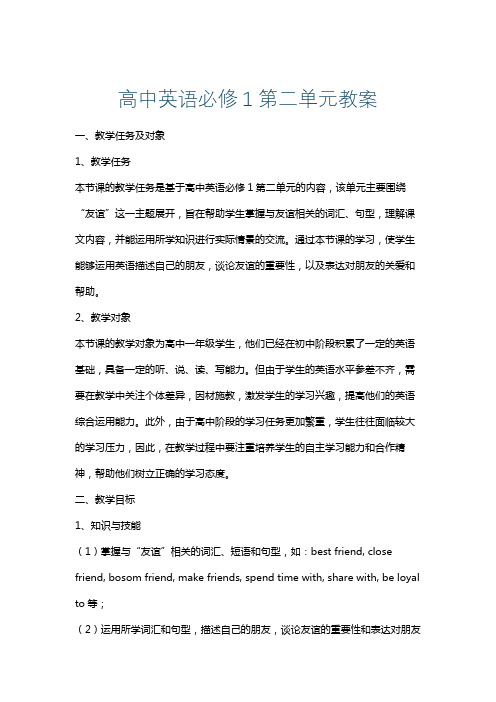
高中英语必修1第二单元教案一、教学任务及对象1、教学任务本节课的教学任务是基于高中英语必修1第二单元的内容,该单元主要围绕“友谊”这一主题展开,旨在帮助学生掌握与友谊相关的词汇、句型,理解课文内容,并能运用所学知识进行实际情景的交流。
通过本节课的学习,使学生能够运用英语描述自己的朋友,谈论友谊的重要性,以及表达对朋友的关爱和帮助。
2、教学对象本节课的教学对象为高中一年级学生,他们已经在初中阶段积累了一定的英语基础,具备一定的听、说、读、写能力。
但由于学生的英语水平参差不齐,需要在教学中关注个体差异,因材施教,激发学生的学习兴趣,提高他们的英语综合运用能力。
此外,由于高中阶段的学习任务更加繁重,学生往往面临较大的学习压力,因此,在教学过程中要注重培养学生的自主学习能力和合作精神,帮助他们树立正确的学习态度。
二、教学目标1、知识与技能(1)掌握与“友谊”相关的词汇、短语和句型,如:best friend, close friend, bosom friend, make friends, spend time with, share with, be loyal to等;(2)运用所学词汇和句型,描述自己的朋友,谈论友谊的重要性和表达对朋友的关爱;(3)理解并运用一般现在时和一般过去时描述朋友之间的互动;(4)提高英语听力、口语、阅读和写作能力,尤其是口语交流能力和阅读理解能力;(5)学会使用英语词典、网络资源等工具,拓展英语学习渠道。
2、过程与方法(1)采用任务型教学法,设计丰富多样的教学活动,如小组讨论、角色扮演、情景模拟等,激发学生的学习兴趣,培养合作精神;(2)鼓励学生主动参与课堂,积极思考,大胆表达,提高学生的自主学习能力;(3)通过课文阅读、听力训练、口语练习等多种形式,帮助学生掌握语言知识,提高语言技能;(4)利用多媒体教学手段,如PPT、视频、音频等,丰富教学资源,提高教学效果;(5)创设真实语境,让学生在实际运用中巩固所学知识,提高语言运用能力。
高中英语Unit2Friendship词汇含解析冀教版必修1
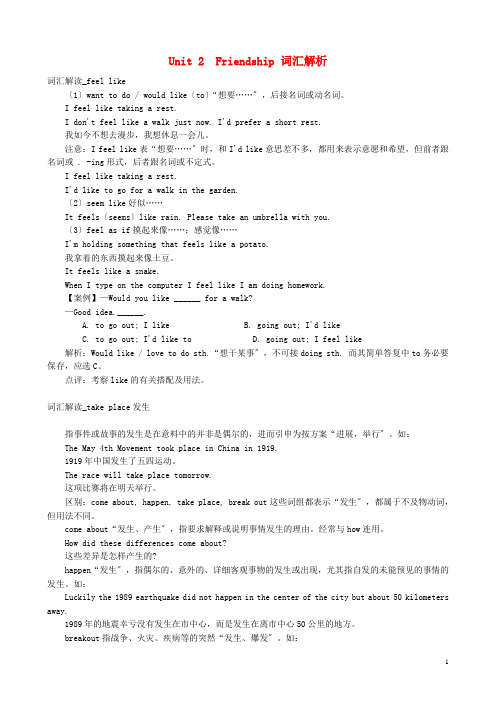
Unit 2 Friendship 词汇解析词汇解读_feel like〔1〕want to do / would like〔to〕“想要……〞,后接名词或动名词。
I feel like taking a rest.I don't feel like a walk just now. I'd prefer a short rest.我如今不想去漫步,我想休息一会儿。
注意:I feel like表“想要……〞时,和I'd like意思差不多,都用来表示意愿和希望,但前者跟名词或 . -ing形式,后者跟名词或不定式。
I feel like taking a rest.I'd like to go for a walk in the garden.〔2〕seem like好似……It feels〔seems〕like rain. Please take an umbrella with you.〔3〕feel as if摸起来像……;感觉像……I'm holding something that feels like a potato.我拿着的东西摸起来像土豆。
It feels like a snake.When I type on the computer I feel like I am doing homework.【案例】—Would you like ______ for a walk?—Good idea.______.A. to go out; I likeB. going out; I'd likeC. to go out; I'd like toD. going out; I feel like解析:Would like / love to do sth.“想干某事〞,不可接doing sth. 而其简单答复中to务必要保存,应选C。
高一英语:Friendship教案

新修订高中阶段原创精品配套教材Friendship教案教材定制 / 提高课堂效率 /内容可修改Friendship lesson plan教师:风老师风顺第二中学编订:FoonShion教育Friendship教案XX-XX学年高一英语必修1(冀教版)素材(含教案和练习)unit 2 friendship (1)一. 教学内容:unit 2 friendship(i)词汇解析:1. express(1)vt.①表达;表示例句:she expressed her thanks (to us). 她(对我们)表示感谢。
his face expressed his disappointment.他脸上浮现出失望的表情。
i cannot express (to you) how encouraging your letter was.你的来信多么令人鼓舞,我无法用言语表达。
常见短语:express oneself 表达自己的意思例句:he expressed himself clearly in english. 他用英文清楚地表达自己的意思。
②快运、快递、快汇(信件、货物等)express an urgent letter 以快递寄出紧急信件(2)adj. 快速的;快递的an express train快车an express highway 高速公路(3)n. 快车(= express train) ;快递服务,快件服务the 9:00 p.m. express to ottawa 下午九点开往渥太华的快车例句:i sent the parcel by express. 我以快递的形式寄那个包裹。
(4)adv. 快速地;用快递方式地to sent the parcel express包裹寄快件例句:he traveled express. 他搭快车去。
词汇拓展:(1)expression n. 表达,说明;表情;措词或短语例句:they greeted him with many expressions of pleasure.他们说了许多表示欢迎他的话。
综合英语(第一册)电子教案Unit2Friendship

Unit2 FriendshipPeriod: 2Teaching Content: Unit2 Friendship(1)Listening and Speaking /Reading Text AAims of Teaching1. To improve the listening and speaking abilities of Ss’2. To improve Ss’ reading ability.Main points in teaching1. Understand the main ideas of Text A and master the useful sentence structures, words and expressions.2. Develop ss’ basic language skills by listening and speaking.Difficult points in teachingUnderstanding of some difficult sentencesTeaching procedures:The first lessonStep1 Lead-inFriendship is like an everyday necessity to us and we cannot live without friends. As friends, we should be honest, royal, reliable and helpful to each other and we should not deceive or betray each other, but believe, respect, understand and appreciate each other. We should also be warm-hearted, enthusiastic, generous and helpful to each other especially when our friends are in trouble.A true friend never cares about our possessions or social status. He or she may live far away from us, but emotionally he or she is very close to us. So, we can chat about everything and share our happiness and hardships with them. In this way, we can fully enjoy our life so that we will feel that our world is getting more and more beautiful and attractive.We hope we can have as many friends as we can, because the more friends we have, the happier we will be.Step2ListeningActivity 1 Sound RecognitionActivity 2 ConversationActivity 3 PassageQuestions and Answers1. Q: What can we know about Mr. Black from the passage?A: He was a very nice doctor.2. Q: Why did people like him and believe him?A: Because he was always ready to help his patients.3. Q: Why did people go to see other doctors when Black was old?A: Because his memory became weak.4. Q: What did people worry about if they went to see him?A: He might give them wrong medicine.5. Q: How did people make him happy when they did not go to see him?A: They told him that there were no patients then.Step3 SpeakingActivity 1A: What time is it now?B: Sorry, I don’t know it exactly.A: Why?B: Because my watch is 4 minutes slow.A: Then what time is it by your watch?B: It’s 7:08 a.m..A: Thank you.B: You’re welcome.Activity 2A: Would you please tell me how to ask about the time politely?B: Yes. There’re several ways of doing that.A: Tell me something about it, would you?B: Yes. First, I think, we’ll have to ask in a polite way, such as “Would you please tell me what time is it now?”A: Oh, I see. We should express ourselves by using some special words or sentence patterns.B: That’s right. Besides, we should express ourselves with some polite body language, such as smiling or nodding, etc.A: I’ve learned a lot from what you said. Thank you.B: You’re welcome.The second periodStep4 ReadingLead-in Activity DiscussionSamplesTrue friendship is a shoulder to rely on, a hand to hold, an ear to listen to your pain or someone to catch you when you fall. I quite agree with this statement. As an English proverb says, a friend in need is a friend in deed. If I feel sad, my friend can listen to me and give me support so that I can have great courage to go on with my work.True friendship is a caring voice, a comforting presence, a sentimental embrace (伤感时拥抱) or someone to wipe away tears. I think there is something in this saying.I think friends should share happiness and hardship. Every people need others’ help. It’s very good to get others’ help when we are in trouble. For example, we’ll feel much better if we can hear a caring voice w hen we’re sad.It’s very difficult for us to get a true friend in our life. If we get a true friend, we’ll be very happy and we should cherish it very much. We can talk with each other about our study and life, share happiness and hardship with each other so that we can improve our friendship.Step 5: Fast reading1 Ask ss to read Text A as fast as they can and to get the general idea of the passage. Then finish the “reading comprehension” on p322. Close books and concentrate on the recording of Text A3. Read the text aloudStep6 Homework1. Recite the new words on Text A and understand Text A2. Finish off Exs on p34-37Reflection on TeachingPeriod: 2Teaching Content: Unit2 Friendship (2)Reading Text A Grammar/Translation and WritingAims of Teaching:1. To develop ss’ ability of understanding a passage2. To learn some basic knowledge of translationMain points of Teaching:1. The usage of some words and expressions2. Understand the main ideas of Text ATeaching difficult points:Some difficult sentencesTeaching procedures:The first periodStep1 Everyday Report by studentsStep2 Explain the exercisesAsk some students to write their answers on the blackboard, then check the answers with the whole class.Step3 The main idea of Text ADivide the class into seven groups, and ask them to discuss the main idea of the passage. Then let some groups to express their opinions.Step4 Language pointshighest form of human relationshipexactly the samekey to opening upon everythingelse's done is done7. practice respect forhis or her ownfocused onbehind your backThe second periodStep5 Translation and WritingKnow about translation: How to choose the right meaning of a word. As we all know, each English word has more than one meaning, which means it has different meaning when in different situations. So, selecting the suitable meaning to express is of great importance while translating.Step6 Finish the Ex on p43.Key to the exercise1.我们的飞机降落在杭州萧山机场。
高中英语必修一unit2教案教学设计
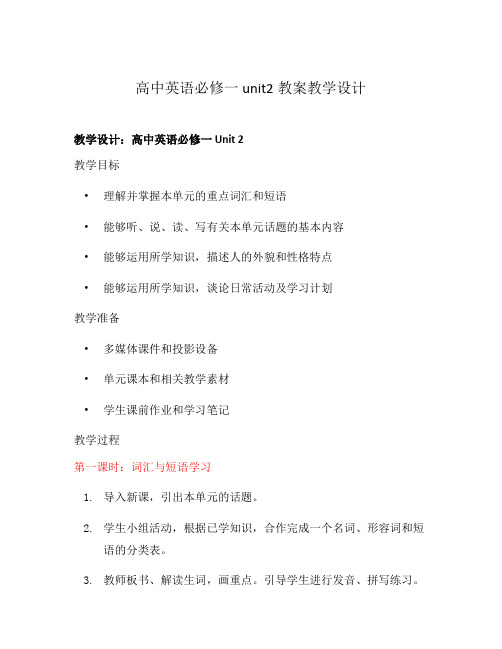
高中英语必修一unit2教案教学设计教学设计:高中英语必修一Unit 2教学目标•理解并掌握本单元的重点词汇和短语•能够听、说、读、写有关本单元话题的基本内容•能够运用所学知识,描述人的外貌和性格特点•能够运用所学知识,谈论日常活动及学习计划教学准备•多媒体课件和投影设备•单元课本和相关教学素材•学生课前作业和学习笔记教学过程第一课时:词汇与短语学习1.导入新课,引出本单元的话题。
2.学生小组活动,根据已学知识,合作完成一个名词、形容词和短语的分类表。
3.教师板书、解读生词,画重点。
引导学生进行发音、拼写练习。
4.学生个人积极思考,用新词汇设计并表达三个有关自己或他人的句子。
鼓励学生使用所学短语。
第二课时:听说训练1.多媒体呈现听力材料,引导学生仔细聆听,并回答问题。
2.学生小组活动,就所听内容展开讨论,鼓励使用本单元的语言表达。
3.随机选择几位学生进行口头表达,展示听说能力,鼓励合理使用本单元的词汇和短语。
第三课时:阅读理解1.学生们阅读本单元的阅读材料,理解文章并挑选关键信息填写阅读答案。
2.学生小组合作,分享阅读理解中的收获,提出问题并交流解决方法。
3.进行小组间的问答竞赛,检验学生对文章内容的理解程度。
第四课时:语言运用1.学生小组活动,运用本单元的句型和短语,设计对话,描述自己的外貌和性格特点。
2.学生交替演练对话,注意语音语调及地道语言表达。
3.分组进行对话展示,班级评价。
教师进行点评,给予表扬和改进建议。
第五课时:写作训练1.学生小组合作,回答书本上的写作任务并撰写一个自我介绍。
2.提供写作指导,引导学生用自己的语言描述自己的外貌、性格和兴趣爱好。
3.学生小组内交流修改,改善写作表达,力求完整、准确和连贯。
扩展活动•学生自主阅读与本单元话题相关的文章或故事,并进行相关讨论与交流。
•学生小组合作,准备一个小剧本,围绕本单元话题展开表演。
课堂反馈•学生个人语言表达能力的提高情况•学生对本单元话题的理解和掌握程度•学生学习及表现的积极性和参与度。
高中英语 Unit 2 Friendship教案 冀教版必修1
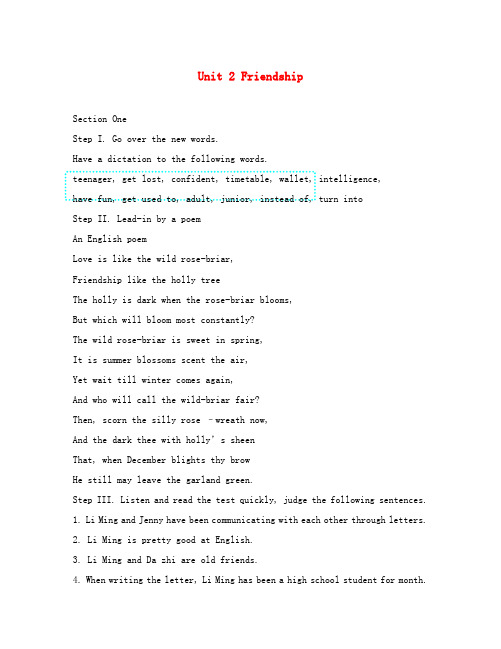
Unit 2 FriendshipSection OneStep I. Go over the new words.Have a dictation to the following words.teenager, get lost, confident, timetable, wallet, intelligence,have fun, get used to, adult, junior, instead of, turn intoStep II. Lead-in by a poemAn English poemLove is like the wild rose-briar,Friendship like the holly treeThe holly is dark when the rose-briar blooms,But which will bloom most constantly?The wild rose-briar is sweet in spring,It is summer blossoms scent the air,Yet wait till winter comes again,And who will call the wild-briar fair?Then, scorn the silly rose –wreath now,And the dark thee with holly’s sheenThat, when December blights thy browHe still may leave the garland green.Step III. Listen and read the test quickly, judge the following sentences.1. Li Ming and Jenny have been communicating with each other through letters.2. Li Ming is pretty good at English.3. Li Ming and Da zhi are old friends.4. When writing the letter, Li Ming has been a high school student for month.5. Jenny feels more creative when she types on the computer.6. Jenny and Pat are best friends.7. In Jenny’s opinion, playing sports is a lot of fun and a good way to meet friends.8. Jenny as well as 5 other girls will have a sleep—over party at School. Step IV. 1. Ask the students read the text carefully and find out confusing language points and important sentences.(1) It is always feels good to have friends to share the good times as well as the bad times.(2) Friendship comes in all shapes, colors, and sizes.(3) Her parents were not as angry as she had originally thought they would be.(4) Although it was painful to lose such a close friend, it built me up into the individual person I am.(5) It seems easier for me to express my thoughts and feelings.2. Ask the students to ask some questions that they can not understand, then if other students can explain, make them answer. And if no one gives the answer, I will explain the confusing points to them, try my best to make the students learn more and be active.Step V. Do exercises.1. ⑴选择做________ ⑵需要________ ⑶想要做________⑷由……组成________ ⑸过一种生活________ ⑹从旁边经过________⑺压力重重 ________ ⑻由于,因为________ ⑼发生,进行________⑽使某人逐渐成为_______ ⑾沉思 ________ ⑿喜欢做________⒀上学________ ⒁集中于________2. ⑴As the e_______ to the cinema, I met a friend of mine.⑵The news s_______ through the village quickly.⑶My father is not much a talker, and he is not good at e______ hisfeelings.⑷The encouraging speech a______ many people’s attention.⑸He has born in a w______ family, but he lived a poor life in his latelife.⑹He is a very famous person, and he is always considered________(有创造力的)⑺He made an_________(通知)that he would go to Japan.⑻I am sure you will come to______(意识到)your mistakes⑼I am happy to have been_______(介绍)to the great scientist.⑽Our English teacher asked me to make a _______(相似的) dialogue. Step VI. HomeworkPreview section 2 and section 4Section 2 and Section 3Step I. Build the students’ comprehension1. Have the students discuss the questions in groups of four.2. Before I divide the class into groups for a short discussion on the this topic, practice the following language patterns.3. When you agree someone you can use these words.You are right.That is trueYou have got itSometimes you have to agree, but you do not want to. Use these words:I am afraid I agree with you.I hate to say it ,but I agreeWhen you strongly disagree, use these words:I don’t think so.I don’t agreeWhen you do not agree, but you want to speak less strongly, use these following words:That is true, but there is a better way.I see what you mean, but don’t you think …..Let the students see the patterns on the screen, practice orally with the class. Keep the patterns on the screen, so that the students can refer to them when they are in groups discussing the topic.Then check the answer of the practice in this part.Step II. Build your vocabularythis can be assigned for homework(Answers: 1. feel like 2. hate 3. agree with 4.go on the trip 5. feel good6. choose/ chose)Step III. Build the listening skillsWith books closed, tell the students they will hear the tape once, then will be asked some true or false questions. Review the meaning of true or false. Play one sentence at a time. After playing the sentence, ask for a volunteer to repeat what was said. If no one heard correctly, play it again. Ask ifthe statement is true or false.Open the book to complete the listening activity.(Answers: Part 1: 1. F 2. F 3. F; Part 2: 1. five 2. talk 3. friends 4. friendly)Step IV. Build the speaking skills1.First ask the students to read the dialogue with their desk mates andthen ask some of them to act out in the class.2.Than tell the students about the pronunciations of the vowel.3.Now check other words on the screen, with each word, ask some studentsto pounce.Step V. Build the writing skillsAsk the students to write a composition “my best friend”Step VI. Grammar: attributive clause1.关系代词 who whom 和thatThe girl______ is sitting next to me is my best friend.The girl_______ I met just now is my best friend.2. that 和whichThe book______ I gave to my best friend is popularThe book_______ is popular was given to my best friend3. whoseDo you know the girl______ name is Mary?We are studying in the classroom______ door faces south4. 关系副词 when ,where 和why.I will never forget the day______ I was born.I will never forget the place_______ I was born.The reason_____ he went there is unknown.Ask the students to study the above part and than ask them to do the exercise in the text book and workbook.Section FourStep I. RevisionGo over the following words.Make friends, express, live a…life, entrance, agree with, type,Indeed, find out, focus, consist of, wealthy, thanks to, consist of Entry, thanks toStep II. Ask the students listen to the type and check the following sentences.1. At the beginning, the royal bull elephant enjoyed the poorly-fed stray dog’s company.2. They soon got used to each other’s company.3. One day, a man bought a dog and took it to a faraway village.4. The royal bull elephant did not mind the dog’s absence.5. The wise minister suggested the king make an official announcement to find the elephant.6. At last the story has a happy ending.Step III. Make the students read the text carefully and give the answers to the following questions.1. Did you know that the elephants and dogs were “natural enemies”.2. Is it impossible for natural enemies to become best friends?3. What is the moral of this story? In other words, what truth or bit of wisdom does the writer want to show us through the story.Step IV. Ask the students read the text carefully and find out confusing language points and important sentences. Then ask the students to ask some questions that they can not understand, then if other students can explain, make them answer. And if no one gives the answer, I will explain the confusing points to them, try my best to make the students learn more and be active. Step V. Exercise短语翻译:1.像往常一样____________2.使….. 平静____________3.从旁边经过____________4.同意某人____________5.借宿别人____________6.发现,弄明白____________7.向……敞开大门 ____________8.….. 原因____________单句该错:1.I did not recognize your friend which came to our class.2.Have you got everything which you need.3. Can you think of a situation which you may use this expression.4. She is one of the students who has won the prize money.5. The doctor always worked heart and soul cured of me.Step V. HomeworkReview this unit and do the exercise.。
冀教版高中英语必修1教案Unit 2 Friendship 1
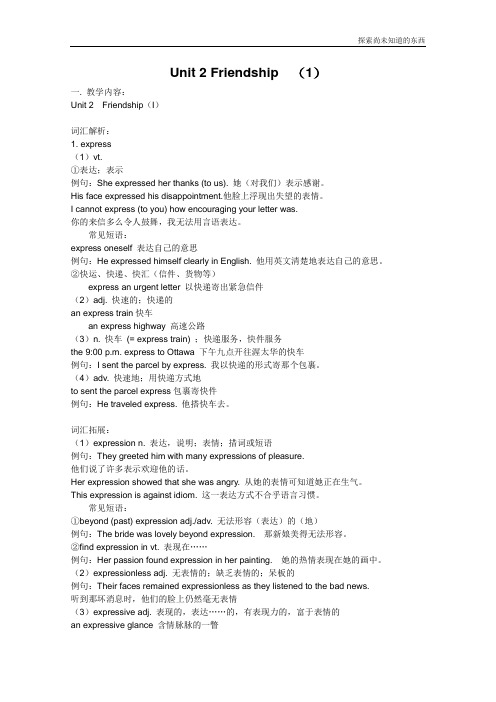
Unit 2 Friendship (1)一. 教学内容:Unit 2 Friendship(I)词汇解析:1. express(1)vt.①表达;表示例句:She expressed her thanks (to us). 她(对我们)表示感谢。
His face expressed his disappointment.他脸上浮现出失望的表情。
I cannot express (to you) how encouraging your letter was.你的来信多么令人鼓舞,我无法用言语表达。
常见短语:express oneself 表达自己的意思例句:He expressed himself clearly in English. 他用英文清楚地表达自己的意思。
②快运、快递、快汇(信件、货物等)express an urgent letter 以快递寄出紧急信件(2)adj. 快速的;快递的an express train快车an express highway 高速公路(3)n. 快车(= express train) ;快递服务,快件服务the 9:00 p.m. express to Ottawa 下午九点开往渥太华的快车例句:I sent the parcel by express. 我以快递的形式寄那个包裹。
(4)adv. 快速地;用快递方式地to sent the parcel express包裹寄快件例句:He traveled express. 他搭快车去。
词汇拓展:(1)expression n. 表达,说明;表情;措词或短语例句:They greeted him with many expressions of pleasure.他们说了许多表示欢迎他的话。
Her expression showed that she was angry. 从她的表情可知道她正在生气。
- 1、下载文档前请自行甄别文档内容的完整性,平台不提供额外的编辑、内容补充、找答案等附加服务。
- 2、"仅部分预览"的文档,不可在线预览部分如存在完整性等问题,可反馈申请退款(可完整预览的文档不适用该条件!)。
- 3、如文档侵犯您的权益,请联系客服反馈,我们会尽快为您处理(人工客服工作时间:9:00-18:30)。
Unit 2 FriendshipSection OneStep I. Go over the new words.Have a dictation to the following words.teenager, get lost, confident, timetable, wallet, intelligence,have fun, get used to, adult, junior, instead of, turn intoStep II. Lead-in by a poemAn English poemLove is like the wild rose-briar,Friendship like the holly treeThe holly is dark when the rose-briar blooms,But which will bloom most constantly?The wild rose-briar is sweet in spring,It is summer blossoms scent the air,Yet wait till winter comes again,And who will call the wild-briar fair?Then, scorn the silly rose –wreath now,And the dark thee with holly’s sheenThat, when December blights thy browHe still may leave the garland green.Step III. Listen and read the test quickly, judge the following sentences.1. Li Ming and Jenny have been communicating with each other through letters.2. Li Ming is pretty good at English.3. Li Ming and Da zhi are old friends.4. When writing the letter, Li Ming has been a high school student for month.5. Jenny feels more creative when she types on the computer.6. Jenny and Pat are best friends.7. In Jenny’s opinion, playing sports is a lot of fun and a good way to meet friends.8. Jenny as well as 5 other girls will have a sleep—over party at School.Step IV. 1. Ask the students read the text carefully and find out confusing language points and important sentences.(1) It is always feels good to have friends to share the good times as well as the bad times.(2) Friendship comes in all shapes, colors, and sizes.(3) Her parents were not as angry as she had originally thought they would be.(4) Although it was painful to lose such a close friend, it built me up into the individual person I am.(5) It seems easier for me to express my thoughts and feelings.2. Ask the students to ask some questions that they can not understand, then if other students can explain, make them answer. And if no one gives the answer, I will explain the confusing points to them, try my best to make the students learn more and be active.Step V. Do exercises.1. ⑴选择做________ ⑵需要________ ⑶想要做________⑷由……组成________ ⑸过一种生活________ ⑹从旁边经过________⑺压力重重________ ⑻由于,因为________ ⑼发生,进行________⑽使某人逐渐成为_______ ⑾沉思________ ⑿喜欢做________ ⒀上学________ ⒁集中于________2. ⑴As the e_______ to the cinema, I met a friend of mine.⑵The news s_______ through the village quickly.⑶My father is not much a talker, and he is not good at e______ his feelings.⑷The encouraging speech a______ many peop le’s attention.⑸He has born in a w______ family, but he lived a poor life in his late life.⑹He is a very famous person, and he is always considered________(有创造力的)⑺He made an_________(通知)that he would go to Japan.⑻I am sure you will come to______(意识到)your mistakes⑼I am happy to have been_______(介绍)to the great scientist.⑽Our English teacher asked me to make a _______(相似的) dialogue.Step VI. HomeworkPreview section 2 and section 4Section 2 and Section 3Step I. Build the students’ comprehension1. Have the students discuss the questions in groups of four.2. Before I divide the class into groups for a short discussion on the this topic, practice the following language patterns.3. When you agree someone you can use these words.You are right.That is trueYou have got itSometimes you have to agree, but you do not want to. Use these words:I am afraid I agree with you.I hate to say it ,but I agreeWhen you strongly disagree, use these words:I don’t think so.I don’t agreeWhen you do not agree, but you want to speak less strongly, use these following words: That is true, but there is a better way.I see what you mean, but don’t you think …..Let the students see the patterns on the screen, practice orally with the class. Keep the patterns on the screen, so that the students can refer to them when they are in groups discussing the topic.Then check the answer of the practice in this part.Step II. Build your vocabularythis can be assigned for homework(Answers: 1. feel like 2. hate 3. agree with 4.go on the trip 5. feel good6. choose/ chose)Step III. Build the listening skillsWith books closed, tell the students they will hear the tape once, then will be asked some true or false questions. Review the meaning of true or false.Play one sentence at a time. After playing the sentence, ask for a volunteer to repeat what was said. If no one heard correctly, play it again. Ask if the statement is true or false.Open the book to complete the listening activity.(Answers: Part 1: 1. F 2. F 3. F; Part 2: 1. five 2. talk 3. friends 4. friendly)Step IV. Build the speaking skills1.First ask the students to read the dialogue with their desk mates and then ask some of them toact out in the class.2.Than tell the students about the pronunciations of the vowel.3.Now check other words on the screen, with each word, ask some students to pounce.Step V. Build the writing skillsAsk the students to write a composition “my best friend”Step VI. Grammar: attributive clause1.关系代词who whom 和thatThe girl______ is sitting next to me is my best friend.The girl_______ I met just now is my best friend.2. that 和whichThe book______ I gave to my best friend is popularThe book_______ is popular was given to my best friend3. whoseDo you know the girl______ name is Mary?We are studying in the classroom______ door faces south4. 关系副词when ,where 和why.I will never forget the day______ I was born.I will never forget the place_______ I was born.The reason_____ he went there is unknown.Ask the students to study the above part and than ask them to do the exercise in the text book and workbook.Section FourStep I. RevisionGo over the following words.Make friends, express, live a…life, entrance, agree with, type,Indeed, find out, focus, consist of, wealthy, thanks to, consist ofEntry, thanks toStep II. Ask the students listen to the type and check the following sentences.1. At the beginning, the royal bull elephant enjoyed the poorly-fed stray dog’s company.2. They soon got used to each other’s company.3. One day, a man bought a dog and took it to a faraway village.4. The royal bull elephant did not mind the dog’s absence.5. The wise minister suggested the king make an official announcement to find the elephant.6. At last the story has a happy ending.Step III. Make the students read the text carefully and give the answers to the following questions.1. Did you know that the elephants and dogs were “natural enemies”.2. Is it impossible for natural enemies to become best friends?3. What is the moral of this story? In other words, what truth or bit of wisdom does the writer want to show us through the story.Step IV. Ask the students read the text carefully and find out confusing language points and important sentences. Then ask the students to ask some questions that they can not understand, then if other students can explain, make them answer. And if no one gives the answer, I will explain the confusing points to them, try my best to make the students learn more and be active.Step V. Exercise短语翻译:1.像往常一样____________2.使….. 平静____________3.从旁边经过____________4.同意某人____________5.借宿别人____________6.发现,弄明白____________7.向…… 敞开大门____________8.….. 原因____________单句该错:1.I did not recognize your friend which came to our class.2.Have you got everything which you need.3. Can you think of a situation which you may use this expression.4. She is one of the students who has won the prize money.5. The doctor always worked heart and soul cured of me.Step V. HomeworkReview this unit and do the exercise.。
